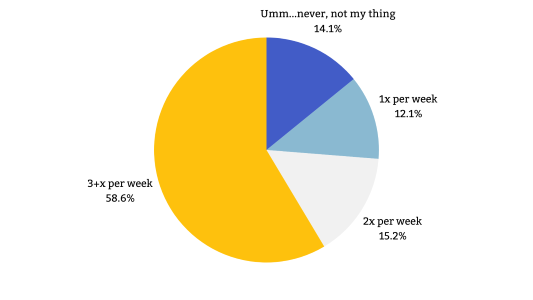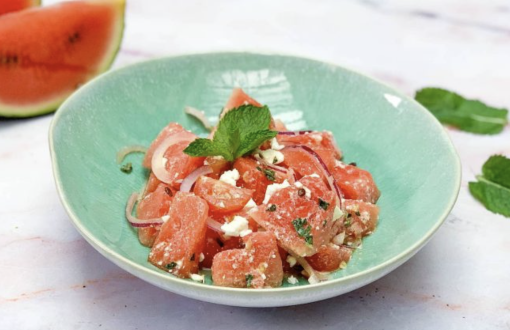Issue #331: Muscle Memory
Good morning. It’s Thursday, April 18th.
Stat of the Day
We lose 3% of our strength every single year starting sometime around the age of 40. (source)
Learn
Muscle Memory
Sarcopenia - bone and muscle loss that makes us frail when we’re “old” is like dementia and heart disease - it starts in our 30’s even if it doesn’t really hit us until decades later.
We lose 3% of our strength every year starting sometime around the age of 40.
Two important points here.
First - the more muscle we start with, the better our chances of maintaining muscle longer in life.
And there is such a thing as muscle memory. The more we workout, the more we positively affect genes related to our muscle fibers. It’s why it’s easier to “get back to the gym” if you’ve been a lifelong weightlifter compared to someone who’s just getting started.
Quick PSA: FOR ALL PARENTS - resistance training is completely safe for kids.
No, that doesn’t mean putting 8-yr olds in the squat rack or maxing out their bench press. But they should start to build strength and stability. The American Academy of Pediatrics even agrees - this helps them boost their health, manage injuries, and get them to understand their body.
So for my 6-yr old - she’s holding yoga poses, learning push-ups, and taking tumbling classes. It can be “fun stuff” too like acting like animals - frog jumps, bear crawls, crab walks.
All of these things will get them off their butts, off their screens and learning how to move and take care of their body.
Second - it’s never too late. We’ve said it before (and we’ll probably say it again) - up until about the age of 60 our metabolism doesn’t slow down, we do.
Even if you weren’t a gym rat in your 20’s and 30’s - that’s ok. But one of the key times to build up muscle is around the age of 50.
During menopause for women - the hormone estrogen drops significantly. Estrogen supports tendons and ligaments - which is why this drop is connected to joint pain. It’s also when women gain weight.
But according to Dr. Gabrielle Lyon it’s not enough to just walk and do cardio classes - this is when women need more protein and should focus on their strength.
While guys don’t go through as dramatic a shift - there’s still an “andropause” around the same age, when our testosterone drops and we become weaker with smaller muscles, accelerated aging, and issues with sexual health. But much of this can be offset by building muscle and eating a high protein diet.
Fortunately - our readers already love to hit the weights. Just about 75% of you do strength training at least 2 days a week and most of you do 3+ days!
Keep going and if you ever need any extra motivation or tips on anything with your workout - you know where to find us (team@thrive25.com)
Try
Protein for Breakfast
Building muscle isn’t just from resistance training - you also need to eat enough protein for muscle protein synthesis. This is when your muscles repair and grow from that workout.
The question of how much protein depends. How old are you, how often do you workout, what are your health goals, do you have any specific health concerns, etc.
But the one thing we can confidently say for everyone - eat protein for breakfast.
Skip the sugary cereals, the bagels and orange juice. Instead, go for eggs, greek yogurt, protein smoothies, smoked salmon or even meat to start your day.
It will boost your protein synthesis, reduce food cravings, and normalize your blood sugar throughout the day.
Thrive25 Partner Spotlight
Caraway is on a mission to craft well-designed home goods that thoughtfully raise the standards of what you cook with - their products are designed to make your life easier and healthier.
Every time Max adds a tablespoon of Zero Acre Farms cultured oil to his Caraway sauté pan, he knows he’s eating healthier and reducing his carbon footprint.
Eat
Tomatoes
Are tomatoes a fruit or a vegetable?
They’re technically berries that come in red, green and yellow and grow on a plant - a tomato plant. Botanically tomatoes are fruit, but are considered vegetables by nutritionists and culinary experts. So the answer is both.
Tomatoes are high in lycopene, a type of carotenoid, as well as several vitamins and minerals including vitamin C, potassium, vitamin K and folate. Originally from South America, tomatoes are renowned across many cultures for their culinary versatility.
Health Benefits
Lycopene: this is a plant compound linked to improved heart health, cancer prevention (including breast and prostate) and protection against sunburns
Eye health: high levels of lutein and zeaxanthin in tomatoes can promote eye health and reduce the risk of age-related macular degeneration
Skin health: The high vitamin C content supports collagen production, contributing to healthy skin and wound healing
How to eat
Serving size: 1 medium-sized tomato
Pairing: tomatoes pair great with ingredients like olive oil, garlic, onions, basil, and balsamic vinegar. Use them in salads, sauces, soups, and sandwiches for added flavor and nutrition
Types: beefsteak, Roma, San Marzano, heirloom, Campari, cherry, grape. The varieties have similar properties, but the first four tend to be higher in lycopene
Warning: tomatoes are nightshades which, besides all their health benefits, contain compounds that can impact the digestive system - so be aware how your body responds and eat, or don’t, accordingly
Cook
Watermelon, Tomato, Feta and Mint Salad
We’re getting close…try this perfect summer salad recipe featuring refreshing watermelon, savory feta cheese, juicy cherry tomatoes, crisp red onion, and fresh mint. This easy-to-prep dish is ideal for hot days, packed with hydrating watermelon, rich in vitamins and antioxidants from tomatoes, and bursting with flavor from the aromatic mint. Perfect for a quick lunch or a dinner side salad!
In the News
Monotasking: In today's fast-paced world, multitasking (rapid task switching) has become second nature for many of us. So, how can we regain focus and become more productive? One strategy is to practice monotasking - do one thing at a time. (NYTimes)
Now the Blind Can See: Brain implants are complex and carry risk, but can change someone’s life. Tiny chips in the brain are now able to create artificial vision for blind people. (WIRED)
Understanding Longevity: Epigenetic noise is linked to age-related diseases. A recent study found that long-lived individuals (LLIs) protect critical gene areas from this noise compared to younger cohorts - especially in essential genes. (Lifespan.io)
Thanks for joining us today!
Check out the latest videos on our YouTube channel
Got feedback, recommendations or stories to share? Tell us what’s on your mind here
Want this direct to your inbox? Sign up here
Why Thrive25
We’re 40-something dads that felt our bodies and minds start to slow down and we’re not ready for that. We found too much information on every subject. So we started Thrive25 to transform what we’ve learned into something useful for the rest of us to spend just 3-5 min a day to optimize our health & longevity.
This newsletter is for you and we truly value your feedback. Never hesitate to reach out to us at team@thrive25.com.
To health!
Sign up for free:
The information in this newsletter is for informational purposes only and may not be appropriate or applicable based on your individual circumstances. Thrive25, Inc. does not provide medical, professional, or licensed advice. Please connect with your healthcare professional for medical advice specific to your health needs.









